Analysis of Human Rights Violations in the Libyan Conflict
VerifiedAdded on 2023/06/08
|6
|2112
|261
Essay
AI Summary
This essay provides a detailed overview of the human rights violations occurring in Libya, focusing on the ongoing conflict between rival governments and armed groups. It highlights the struggles faced by the Libyan people, including lack of access to basic necessities like food, shelter, and healthcare. The essay examines the involvement of militias and armed groups in severe human rights abuses such as arbitrary detention, kidnapping, torture, and unlawful killings. It also addresses the plight of refugees and migrants, who experience sexual harassment, forced labor, and other forms of abuse. The essay references reports from the UN and organizations like Lawyers for Justice in Libya (LFJL), which are working to document and address these violations. It also discusses the failures of the International Criminal Court (ICC) and the collapse of the criminal justice system in Libya. The essay concludes by emphasizing the need for international intervention and accountability to protect human rights in Libya.
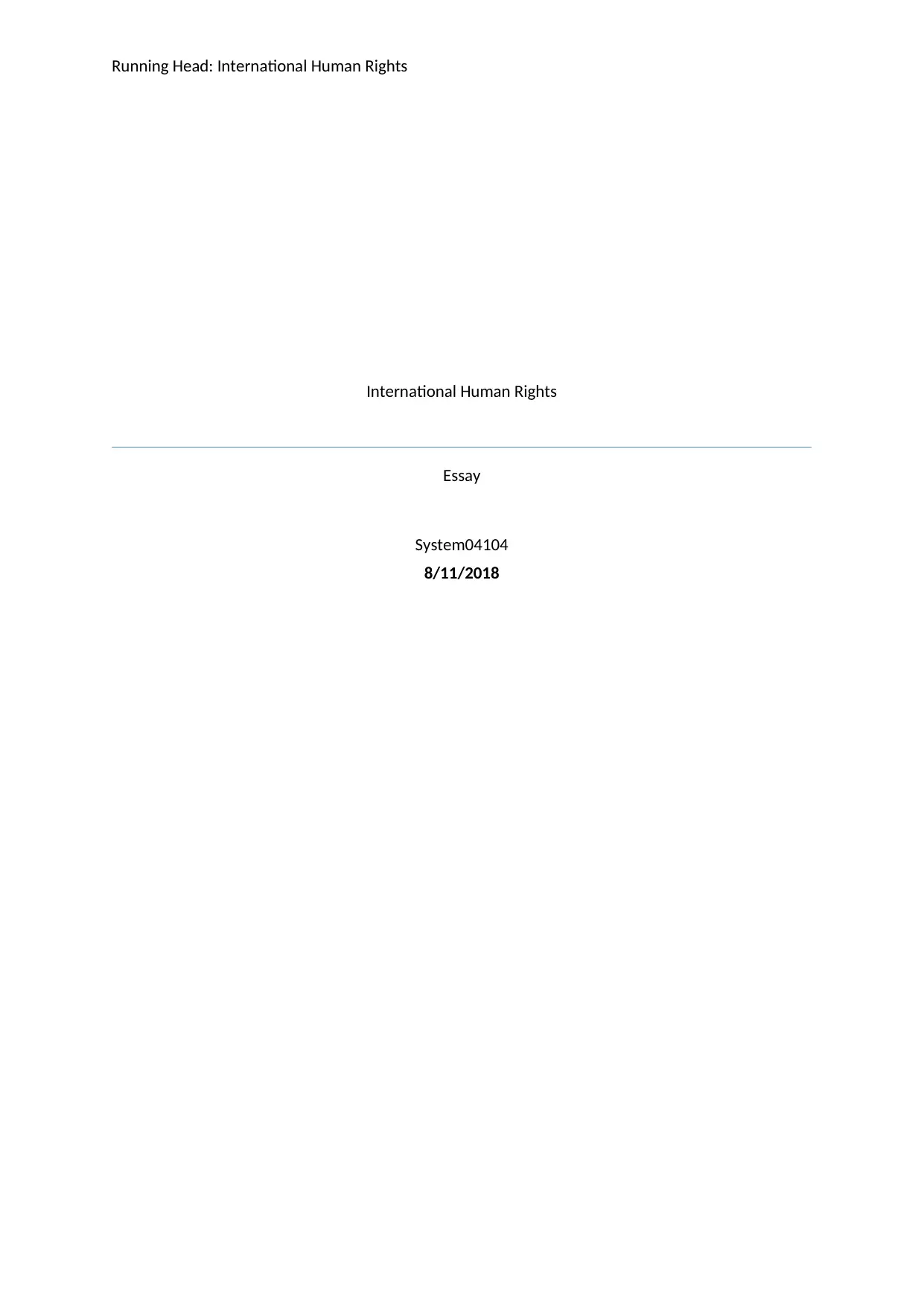
Running Head: International Human Rights
International Human Rights
Essay
System04104
8/11/2018
International Human Rights
Essay
System04104
8/11/2018
Paraphrase This Document
Need a fresh take? Get an instant paraphrase of this document with our AI Paraphraser
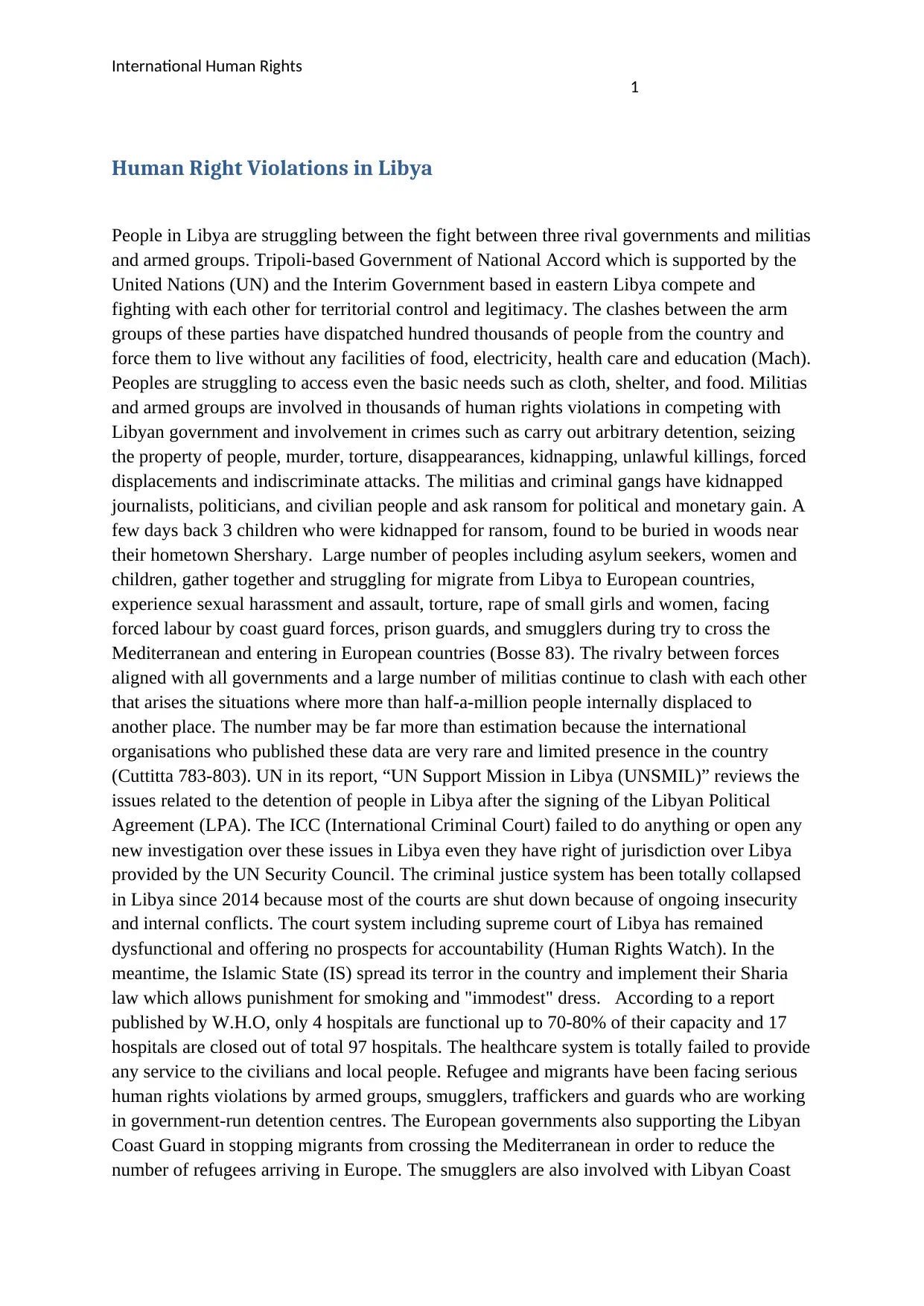
International Human Rights
1
Human Right Violations in Libya
People in Libya are struggling between the fight between three rival governments and militias
and armed groups. Tripoli-based Government of National Accord which is supported by the
United Nations (UN) and the Interim Government based in eastern Libya compete and
fighting with each other for territorial control and legitimacy. The clashes between the arm
groups of these parties have dispatched hundred thousands of people from the country and
force them to live without any facilities of food, electricity, health care and education (Mach).
Peoples are struggling to access even the basic needs such as cloth, shelter, and food. Militias
and armed groups are involved in thousands of human rights violations in competing with
Libyan government and involvement in crimes such as carry out arbitrary detention, seizing
the property of people, murder, torture, disappearances, kidnapping, unlawful killings, forced
displacements and indiscriminate attacks. The militias and criminal gangs have kidnapped
journalists, politicians, and civilian people and ask ransom for political and monetary gain. A
few days back 3 children who were kidnapped for ransom, found to be buried in woods near
their hometown Shershary. Large number of peoples including asylum seekers, women and
children, gather together and struggling for migrate from Libya to European countries,
experience sexual harassment and assault, torture, rape of small girls and women, facing
forced labour by coast guard forces, prison guards, and smugglers during try to cross the
Mediterranean and entering in European countries (Bosse 83). The rivalry between forces
aligned with all governments and a large number of militias continue to clash with each other
that arises the situations where more than half-a-million people internally displaced to
another place. The number may be far more than estimation because the international
organisations who published these data are very rare and limited presence in the country
(Cuttitta 783-803). UN in its report, “UN Support Mission in Libya (UNSMIL)” reviews the
issues related to the detention of people in Libya after the signing of the Libyan Political
Agreement (LPA). The ICC (International Criminal Court) failed to do anything or open any
new investigation over these issues in Libya even they have right of jurisdiction over Libya
provided by the UN Security Council. The criminal justice system has been totally collapsed
in Libya since 2014 because most of the courts are shut down because of ongoing insecurity
and internal conflicts. The court system including supreme court of Libya has remained
dysfunctional and offering no prospects for accountability (Human Rights Watch). In the
meantime, the Islamic State (IS) spread its terror in the country and implement their Sharia
law which allows punishment for smoking and "immodest" dress. According to a report
published by W.H.O, only 4 hospitals are functional up to 70-80% of their capacity and 17
hospitals are closed out of total 97 hospitals. The healthcare system is totally failed to provide
any service to the civilians and local people. Refugee and migrants have been facing serious
human rights violations by armed groups, smugglers, traffickers and guards who are working
in government-run detention centres. The European governments also supporting the Libyan
Coast Guard in stopping migrants from crossing the Mediterranean in order to reduce the
number of refugees arriving in Europe. The smugglers are also involved with Libyan Coast
1
Human Right Violations in Libya
People in Libya are struggling between the fight between three rival governments and militias
and armed groups. Tripoli-based Government of National Accord which is supported by the
United Nations (UN) and the Interim Government based in eastern Libya compete and
fighting with each other for territorial control and legitimacy. The clashes between the arm
groups of these parties have dispatched hundred thousands of people from the country and
force them to live without any facilities of food, electricity, health care and education (Mach).
Peoples are struggling to access even the basic needs such as cloth, shelter, and food. Militias
and armed groups are involved in thousands of human rights violations in competing with
Libyan government and involvement in crimes such as carry out arbitrary detention, seizing
the property of people, murder, torture, disappearances, kidnapping, unlawful killings, forced
displacements and indiscriminate attacks. The militias and criminal gangs have kidnapped
journalists, politicians, and civilian people and ask ransom for political and monetary gain. A
few days back 3 children who were kidnapped for ransom, found to be buried in woods near
their hometown Shershary. Large number of peoples including asylum seekers, women and
children, gather together and struggling for migrate from Libya to European countries,
experience sexual harassment and assault, torture, rape of small girls and women, facing
forced labour by coast guard forces, prison guards, and smugglers during try to cross the
Mediterranean and entering in European countries (Bosse 83). The rivalry between forces
aligned with all governments and a large number of militias continue to clash with each other
that arises the situations where more than half-a-million people internally displaced to
another place. The number may be far more than estimation because the international
organisations who published these data are very rare and limited presence in the country
(Cuttitta 783-803). UN in its report, “UN Support Mission in Libya (UNSMIL)” reviews the
issues related to the detention of people in Libya after the signing of the Libyan Political
Agreement (LPA). The ICC (International Criminal Court) failed to do anything or open any
new investigation over these issues in Libya even they have right of jurisdiction over Libya
provided by the UN Security Council. The criminal justice system has been totally collapsed
in Libya since 2014 because most of the courts are shut down because of ongoing insecurity
and internal conflicts. The court system including supreme court of Libya has remained
dysfunctional and offering no prospects for accountability (Human Rights Watch). In the
meantime, the Islamic State (IS) spread its terror in the country and implement their Sharia
law which allows punishment for smoking and "immodest" dress. According to a report
published by W.H.O, only 4 hospitals are functional up to 70-80% of their capacity and 17
hospitals are closed out of total 97 hospitals. The healthcare system is totally failed to provide
any service to the civilians and local people. Refugee and migrants have been facing serious
human rights violations by armed groups, smugglers, traffickers and guards who are working
in government-run detention centres. The European governments also supporting the Libyan
Coast Guard in stopping migrants from crossing the Mediterranean in order to reduce the
number of refugees arriving in Europe. The smugglers are also involved with Libyan Coast
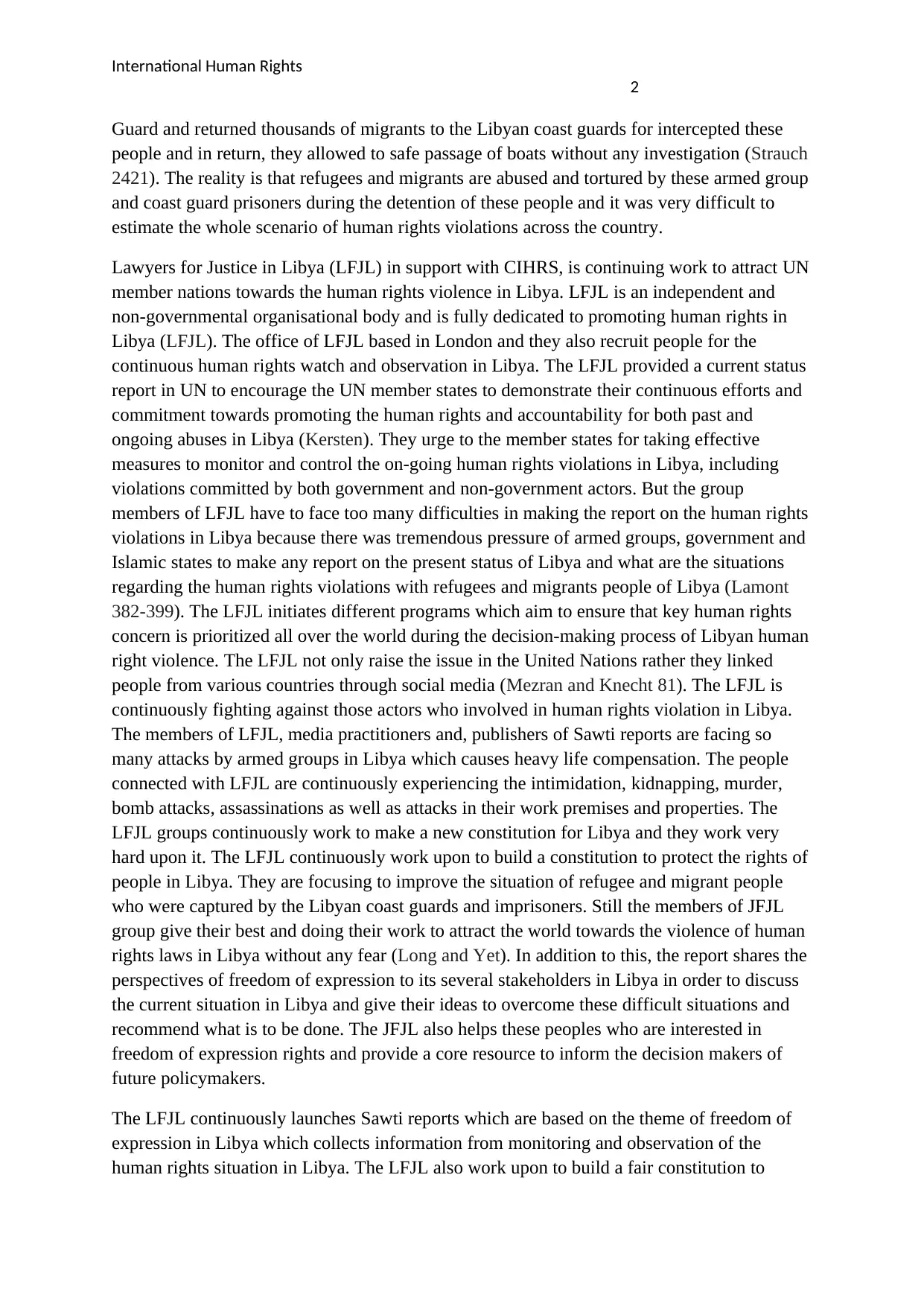
International Human Rights
2
Guard and returned thousands of migrants to the Libyan coast guards for intercepted these
people and in return, they allowed to safe passage of boats without any investigation (Strauch
2421). The reality is that refugees and migrants are abused and tortured by these armed group
and coast guard prisoners during the detention of these people and it was very difficult to
estimate the whole scenario of human rights violations across the country.
Lawyers for Justice in Libya (LFJL) in support with CIHRS, is continuing work to attract UN
member nations towards the human rights violence in Libya. LFJL is an independent and
non-governmental organisational body and is fully dedicated to promoting human rights in
Libya (LFJL). The office of LFJL based in London and they also recruit people for the
continuous human rights watch and observation in Libya. The LFJL provided a current status
report in UN to encourage the UN member states to demonstrate their continuous efforts and
commitment towards promoting the human rights and accountability for both past and
ongoing abuses in Libya (Kersten). They urge to the member states for taking effective
measures to monitor and control the on-going human rights violations in Libya, including
violations committed by both government and non-government actors. But the group
members of LFJL have to face too many difficulties in making the report on the human rights
violations in Libya because there was tremendous pressure of armed groups, government and
Islamic states to make any report on the present status of Libya and what are the situations
regarding the human rights violations with refugees and migrants people of Libya (Lamont
382-399). The LFJL initiates different programs which aim to ensure that key human rights
concern is prioritized all over the world during the decision-making process of Libyan human
right violence. The LFJL not only raise the issue in the United Nations rather they linked
people from various countries through social media (Mezran and Knecht 81). The LFJL is
continuously fighting against those actors who involved in human rights violation in Libya.
The members of LFJL, media practitioners and, publishers of Sawti reports are facing so
many attacks by armed groups in Libya which causes heavy life compensation. The people
connected with LFJL are continuously experiencing the intimidation, kidnapping, murder,
bomb attacks, assassinations as well as attacks in their work premises and properties. The
LFJL groups continuously work to make a new constitution for Libya and they work very
hard upon it. The LFJL continuously work upon to build a constitution to protect the rights of
people in Libya. They are focusing to improve the situation of refugee and migrant people
who were captured by the Libyan coast guards and imprisoners. Still the members of JFJL
group give their best and doing their work to attract the world towards the violence of human
rights laws in Libya without any fear (Long and Yet). In addition to this, the report shares the
perspectives of freedom of expression to its several stakeholders in Libya in order to discuss
the current situation in Libya and give their ideas to overcome these difficult situations and
recommend what is to be done. The JFJL also helps these peoples who are interested in
freedom of expression rights and provide a core resource to inform the decision makers of
future policymakers.
The LFJL continuously launches Sawti reports which are based on the theme of freedom of
expression in Libya which collects information from monitoring and observation of the
human rights situation in Libya. The LFJL also work upon to build a fair constitution to
2
Guard and returned thousands of migrants to the Libyan coast guards for intercepted these
people and in return, they allowed to safe passage of boats without any investigation (Strauch
2421). The reality is that refugees and migrants are abused and tortured by these armed group
and coast guard prisoners during the detention of these people and it was very difficult to
estimate the whole scenario of human rights violations across the country.
Lawyers for Justice in Libya (LFJL) in support with CIHRS, is continuing work to attract UN
member nations towards the human rights violence in Libya. LFJL is an independent and
non-governmental organisational body and is fully dedicated to promoting human rights in
Libya (LFJL). The office of LFJL based in London and they also recruit people for the
continuous human rights watch and observation in Libya. The LFJL provided a current status
report in UN to encourage the UN member states to demonstrate their continuous efforts and
commitment towards promoting the human rights and accountability for both past and
ongoing abuses in Libya (Kersten). They urge to the member states for taking effective
measures to monitor and control the on-going human rights violations in Libya, including
violations committed by both government and non-government actors. But the group
members of LFJL have to face too many difficulties in making the report on the human rights
violations in Libya because there was tremendous pressure of armed groups, government and
Islamic states to make any report on the present status of Libya and what are the situations
regarding the human rights violations with refugees and migrants people of Libya (Lamont
382-399). The LFJL initiates different programs which aim to ensure that key human rights
concern is prioritized all over the world during the decision-making process of Libyan human
right violence. The LFJL not only raise the issue in the United Nations rather they linked
people from various countries through social media (Mezran and Knecht 81). The LFJL is
continuously fighting against those actors who involved in human rights violation in Libya.
The members of LFJL, media practitioners and, publishers of Sawti reports are facing so
many attacks by armed groups in Libya which causes heavy life compensation. The people
connected with LFJL are continuously experiencing the intimidation, kidnapping, murder,
bomb attacks, assassinations as well as attacks in their work premises and properties. The
LFJL groups continuously work to make a new constitution for Libya and they work very
hard upon it. The LFJL continuously work upon to build a constitution to protect the rights of
people in Libya. They are focusing to improve the situation of refugee and migrant people
who were captured by the Libyan coast guards and imprisoners. Still the members of JFJL
group give their best and doing their work to attract the world towards the violence of human
rights laws in Libya without any fear (Long and Yet). In addition to this, the report shares the
perspectives of freedom of expression to its several stakeholders in Libya in order to discuss
the current situation in Libya and give their ideas to overcome these difficult situations and
recommend what is to be done. The JFJL also helps these peoples who are interested in
freedom of expression rights and provide a core resource to inform the decision makers of
future policymakers.
The LFJL continuously launches Sawti reports which are based on the theme of freedom of
expression in Libya which collects information from monitoring and observation of the
human rights situation in Libya. The LFJL also work upon to build a fair constitution to
⊘ This is a preview!⊘
Do you want full access?
Subscribe today to unlock all pages.

Trusted by 1+ million students worldwide
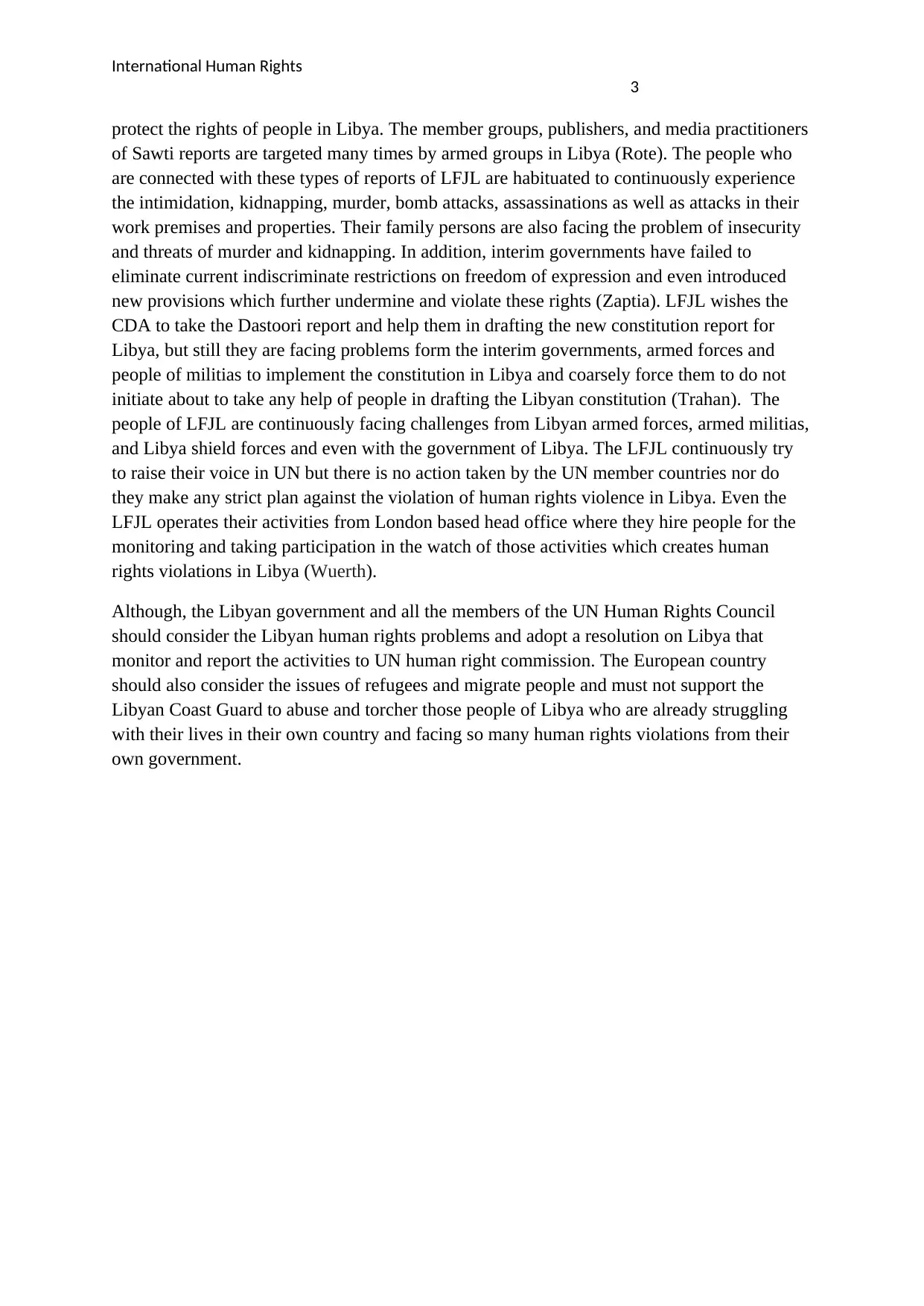
International Human Rights
3
protect the rights of people in Libya. The member groups, publishers, and media practitioners
of Sawti reports are targeted many times by armed groups in Libya (Rote). The people who
are connected with these types of reports of LFJL are habituated to continuously experience
the intimidation, kidnapping, murder, bomb attacks, assassinations as well as attacks in their
work premises and properties. Their family persons are also facing the problem of insecurity
and threats of murder and kidnapping. In addition, interim governments have failed to
eliminate current indiscriminate restrictions on freedom of expression and even introduced
new provisions which further undermine and violate these rights (Zaptia). LFJL wishes the
CDA to take the Dastoori report and help them in drafting the new constitution report for
Libya, but still they are facing problems form the interim governments, armed forces and
people of militias to implement the constitution in Libya and coarsely force them to do not
initiate about to take any help of people in drafting the Libyan constitution (Trahan). The
people of LFJL are continuously facing challenges from Libyan armed forces, armed militias,
and Libya shield forces and even with the government of Libya. The LFJL continuously try
to raise their voice in UN but there is no action taken by the UN member countries nor do
they make any strict plan against the violation of human rights violence in Libya. Even the
LFJL operates their activities from London based head office where they hire people for the
monitoring and taking participation in the watch of those activities which creates human
rights violations in Libya (Wuerth).
Although, the Libyan government and all the members of the UN Human Rights Council
should consider the Libyan human rights problems and adopt a resolution on Libya that
monitor and report the activities to UN human right commission. The European country
should also consider the issues of refugees and migrate people and must not support the
Libyan Coast Guard to abuse and torcher those people of Libya who are already struggling
with their lives in their own country and facing so many human rights violations from their
own government.
3
protect the rights of people in Libya. The member groups, publishers, and media practitioners
of Sawti reports are targeted many times by armed groups in Libya (Rote). The people who
are connected with these types of reports of LFJL are habituated to continuously experience
the intimidation, kidnapping, murder, bomb attacks, assassinations as well as attacks in their
work premises and properties. Their family persons are also facing the problem of insecurity
and threats of murder and kidnapping. In addition, interim governments have failed to
eliminate current indiscriminate restrictions on freedom of expression and even introduced
new provisions which further undermine and violate these rights (Zaptia). LFJL wishes the
CDA to take the Dastoori report and help them in drafting the new constitution report for
Libya, but still they are facing problems form the interim governments, armed forces and
people of militias to implement the constitution in Libya and coarsely force them to do not
initiate about to take any help of people in drafting the Libyan constitution (Trahan). The
people of LFJL are continuously facing challenges from Libyan armed forces, armed militias,
and Libya shield forces and even with the government of Libya. The LFJL continuously try
to raise their voice in UN but there is no action taken by the UN member countries nor do
they make any strict plan against the violation of human rights violence in Libya. Even the
LFJL operates their activities from London based head office where they hire people for the
monitoring and taking participation in the watch of those activities which creates human
rights violations in Libya (Wuerth).
Although, the Libyan government and all the members of the UN Human Rights Council
should consider the Libyan human rights problems and adopt a resolution on Libya that
monitor and report the activities to UN human right commission. The European country
should also consider the issues of refugees and migrate people and must not support the
Libyan Coast Guard to abuse and torcher those people of Libya who are already struggling
with their lives in their own country and facing so many human rights violations from their
own government.
Paraphrase This Document
Need a fresh take? Get an instant paraphrase of this document with our AI Paraphraser
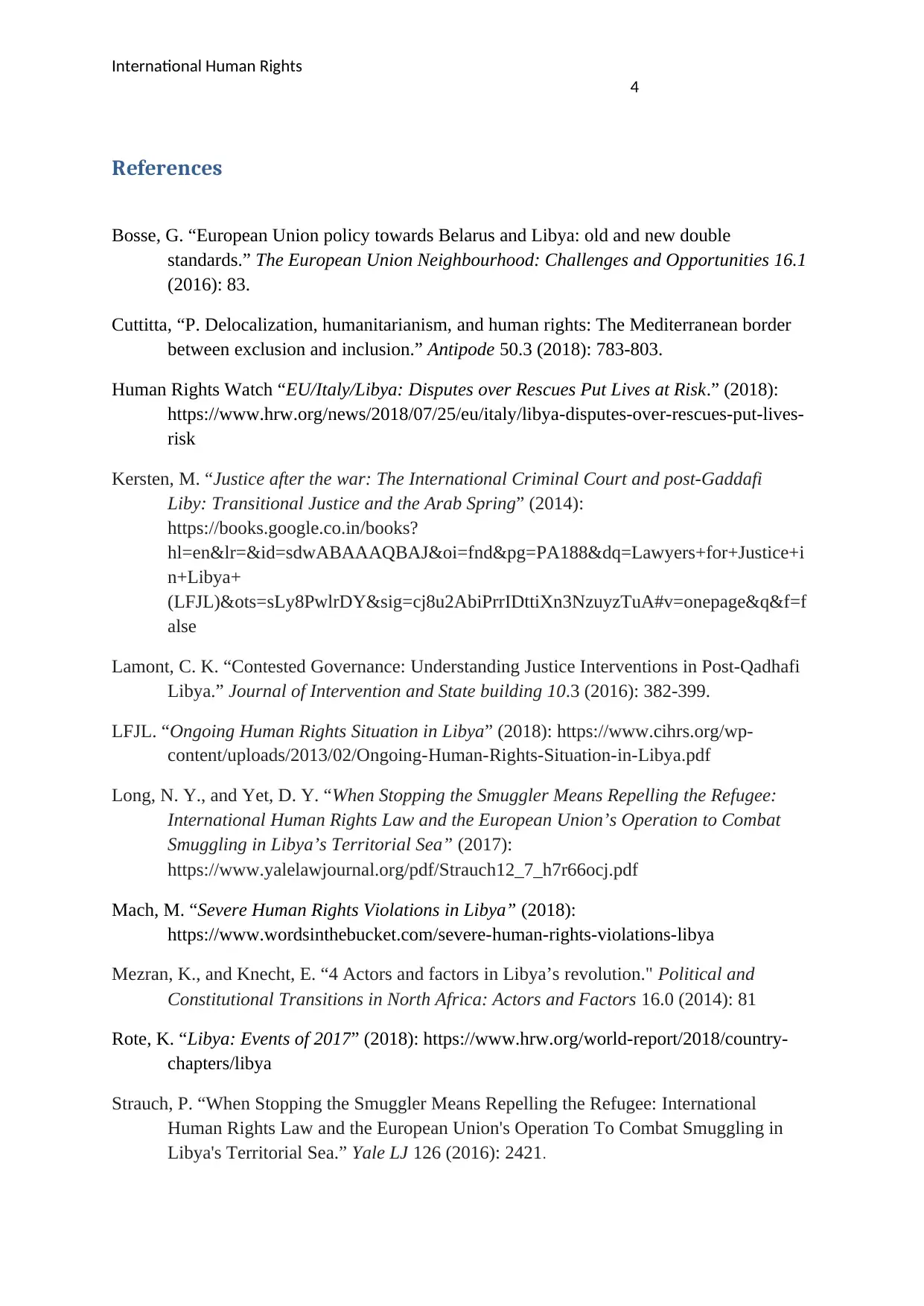
International Human Rights
4
References
Bosse, G. “European Union policy towards Belarus and Libya: old and new double
standards.” The European Union Neighbourhood: Challenges and Opportunities 16.1
(2016): 83.
Cuttitta, “P. Delocalization, humanitarianism, and human rights: The Mediterranean border
between exclusion and inclusion.” Antipode 50.3 (2018): 783-803.
Human Rights Watch “EU/Italy/Libya: Disputes over Rescues Put Lives at Risk.” (2018):
https://www.hrw.org/news/2018/07/25/eu/italy/libya-disputes-over-rescues-put-lives-
risk
Kersten, M. “Justice after the war: The International Criminal Court and post-Gaddafi
Liby: Transitional Justice and the Arab Spring” (2014):
https://books.google.co.in/books?
hl=en&lr=&id=sdwABAAAQBAJ&oi=fnd&pg=PA188&dq=Lawyers+for+Justice+i
n+Libya+
(LFJL)&ots=sLy8PwlrDY&sig=cj8u2AbiPrrIDttiXn3NzuyzTuA#v=onepage&q&f=f
alse
Lamont, C. K. “Contested Governance: Understanding Justice Interventions in Post-Qadhafi
Libya.” Journal of Intervention and State building 10.3 (2016): 382-399.
LFJL. “Ongoing Human Rights Situation in Libya” (2018): https://www.cihrs.org/wp-
content/uploads/2013/02/Ongoing-Human-Rights-Situation-in-Libya.pdf
Long, N. Y., and Yet, D. Y. “When Stopping the Smuggler Means Repelling the Refugee:
International Human Rights Law and the European Union’s Operation to Combat
Smuggling in Libya’s Territorial Sea” (2017):
https://www.yalelawjournal.org/pdf/Strauch12_7_h7r66ocj.pdf
Mach, M. “Severe Human Rights Violations in Libya” (2018):
https://www.wordsinthebucket.com/severe-human-rights-violations-libya
Mezran, K., and Knecht, E. “4 Actors and factors in Libya’s revolution." Political and
Constitutional Transitions in North Africa: Actors and Factors 16.0 (2014): 81
Rote, K. “Libya: Events of 2017” (2018): https://www.hrw.org/world-report/2018/country-
chapters/libya
Strauch, P. “When Stopping the Smuggler Means Repelling the Refugee: International
Human Rights Law and the European Union's Operation To Combat Smuggling in
Libya's Territorial Sea.” Yale LJ 126 (2016): 2421.
4
References
Bosse, G. “European Union policy towards Belarus and Libya: old and new double
standards.” The European Union Neighbourhood: Challenges and Opportunities 16.1
(2016): 83.
Cuttitta, “P. Delocalization, humanitarianism, and human rights: The Mediterranean border
between exclusion and inclusion.” Antipode 50.3 (2018): 783-803.
Human Rights Watch “EU/Italy/Libya: Disputes over Rescues Put Lives at Risk.” (2018):
https://www.hrw.org/news/2018/07/25/eu/italy/libya-disputes-over-rescues-put-lives-
risk
Kersten, M. “Justice after the war: The International Criminal Court and post-Gaddafi
Liby: Transitional Justice and the Arab Spring” (2014):
https://books.google.co.in/books?
hl=en&lr=&id=sdwABAAAQBAJ&oi=fnd&pg=PA188&dq=Lawyers+for+Justice+i
n+Libya+
(LFJL)&ots=sLy8PwlrDY&sig=cj8u2AbiPrrIDttiXn3NzuyzTuA#v=onepage&q&f=f
alse
Lamont, C. K. “Contested Governance: Understanding Justice Interventions in Post-Qadhafi
Libya.” Journal of Intervention and State building 10.3 (2016): 382-399.
LFJL. “Ongoing Human Rights Situation in Libya” (2018): https://www.cihrs.org/wp-
content/uploads/2013/02/Ongoing-Human-Rights-Situation-in-Libya.pdf
Long, N. Y., and Yet, D. Y. “When Stopping the Smuggler Means Repelling the Refugee:
International Human Rights Law and the European Union’s Operation to Combat
Smuggling in Libya’s Territorial Sea” (2017):
https://www.yalelawjournal.org/pdf/Strauch12_7_h7r66ocj.pdf
Mach, M. “Severe Human Rights Violations in Libya” (2018):
https://www.wordsinthebucket.com/severe-human-rights-violations-libya
Mezran, K., and Knecht, E. “4 Actors and factors in Libya’s revolution." Political and
Constitutional Transitions in North Africa: Actors and Factors 16.0 (2014): 81
Rote, K. “Libya: Events of 2017” (2018): https://www.hrw.org/world-report/2018/country-
chapters/libya
Strauch, P. “When Stopping the Smuggler Means Repelling the Refugee: International
Human Rights Law and the European Union's Operation To Combat Smuggling in
Libya's Territorial Sea.” Yale LJ 126 (2016): 2421.
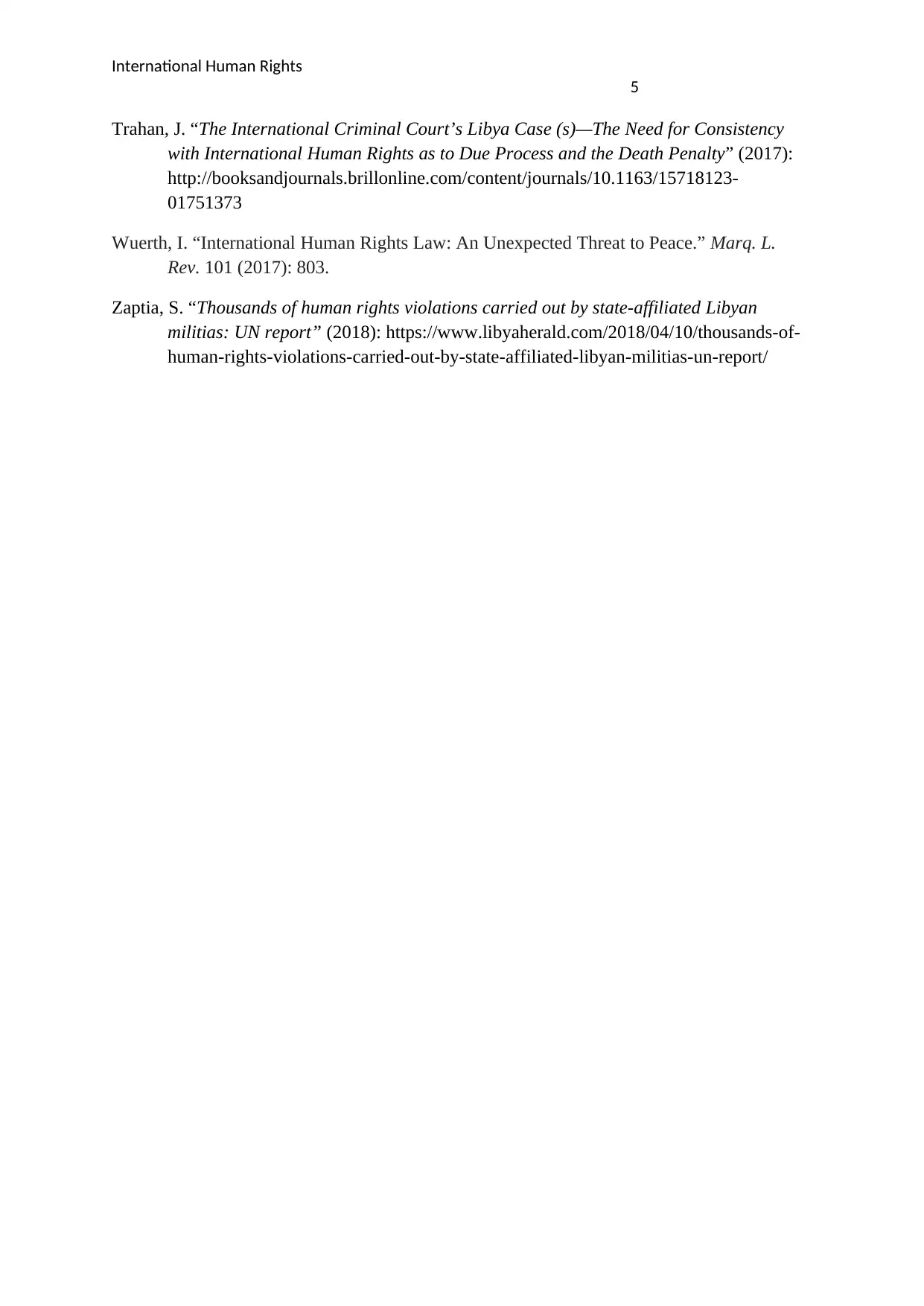
International Human Rights
5
Trahan, J. “The International Criminal Court’s Libya Case (s)—The Need for Consistency
with International Human Rights as to Due Process and the Death Penalty” (2017):
http://booksandjournals.brillonline.com/content/journals/10.1163/15718123-
01751373
Wuerth, I. “International Human Rights Law: An Unexpected Threat to Peace.” Marq. L.
Rev. 101 (2017): 803.
Zaptia, S. “Thousands of human rights violations carried out by state-affiliated Libyan
militias: UN report” (2018): https://www.libyaherald.com/2018/04/10/thousands-of-
human-rights-violations-carried-out-by-state-affiliated-libyan-militias-un-report/
5
Trahan, J. “The International Criminal Court’s Libya Case (s)—The Need for Consistency
with International Human Rights as to Due Process and the Death Penalty” (2017):
http://booksandjournals.brillonline.com/content/journals/10.1163/15718123-
01751373
Wuerth, I. “International Human Rights Law: An Unexpected Threat to Peace.” Marq. L.
Rev. 101 (2017): 803.
Zaptia, S. “Thousands of human rights violations carried out by state-affiliated Libyan
militias: UN report” (2018): https://www.libyaherald.com/2018/04/10/thousands-of-
human-rights-violations-carried-out-by-state-affiliated-libyan-militias-un-report/
⊘ This is a preview!⊘
Do you want full access?
Subscribe today to unlock all pages.

Trusted by 1+ million students worldwide
1 out of 6
Related Documents
Your All-in-One AI-Powered Toolkit for Academic Success.
+13062052269
info@desklib.com
Available 24*7 on WhatsApp / Email
![[object Object]](/_next/static/media/star-bottom.7253800d.svg)
Unlock your academic potential
Copyright © 2020–2026 A2Z Services. All Rights Reserved. Developed and managed by ZUCOL.





